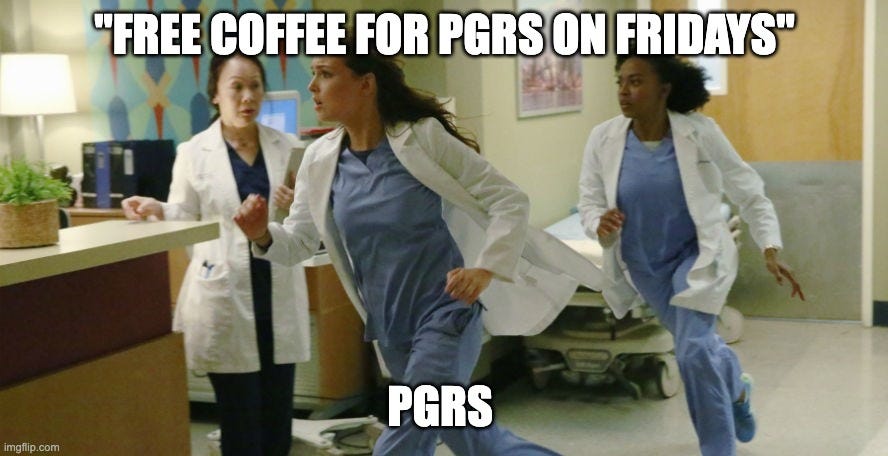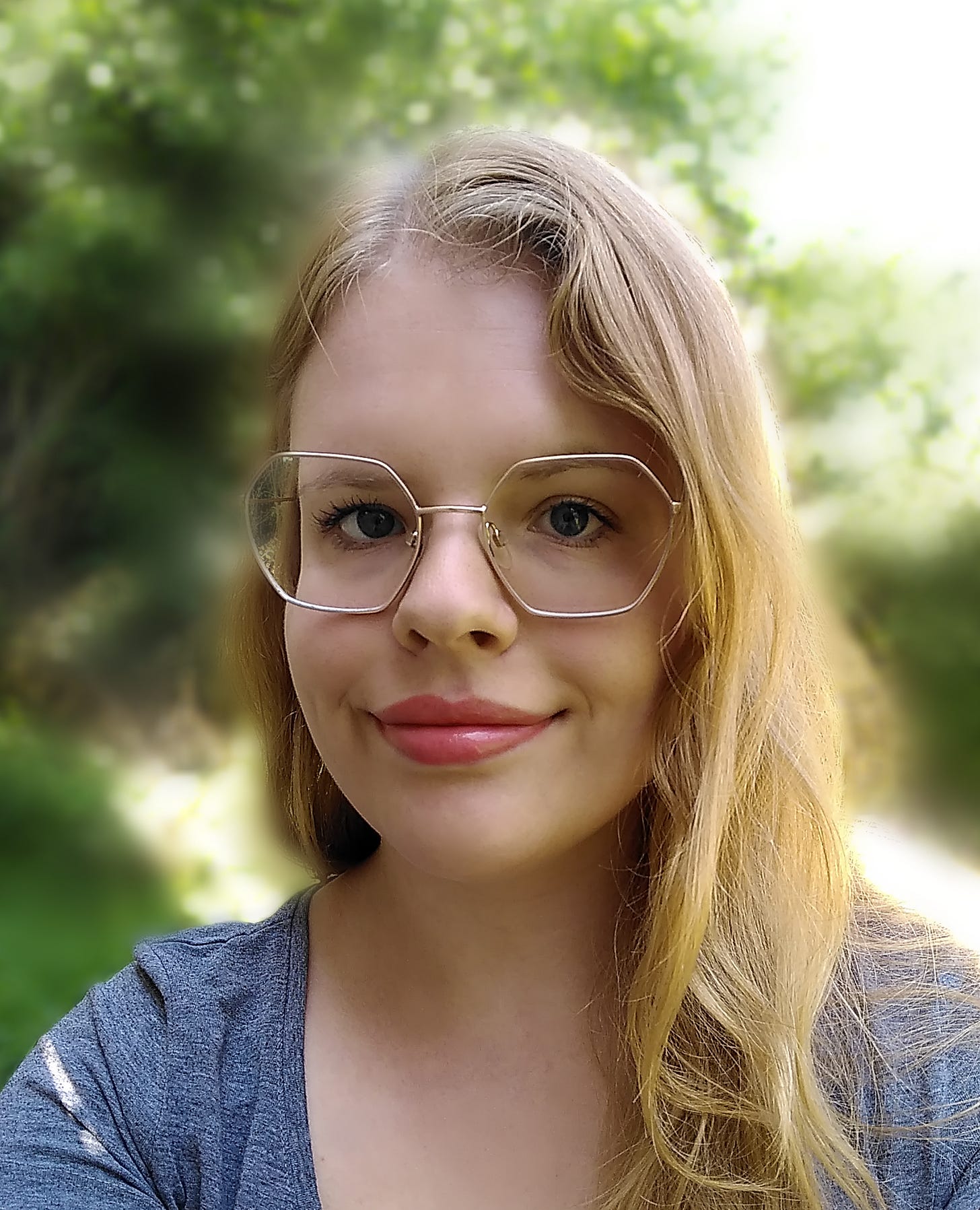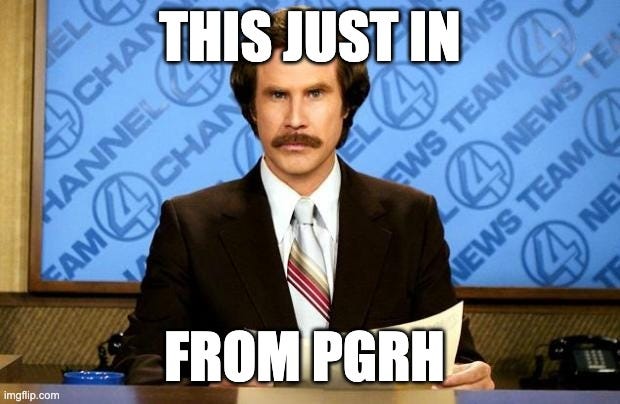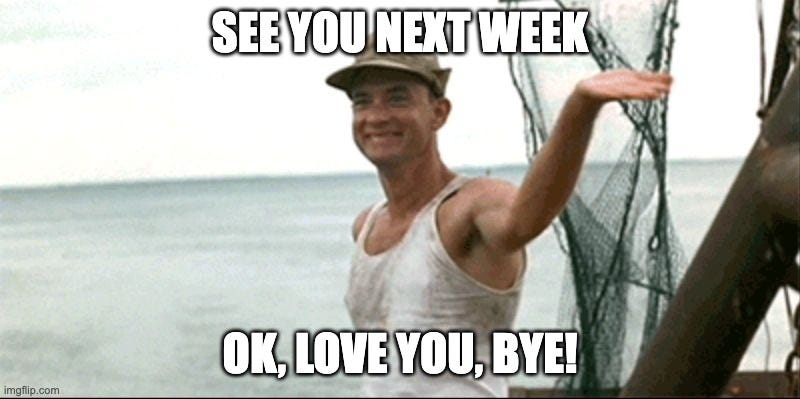Accessibility, Mapping Progress and Citation Politics
Spooky (teaching) season is on the horizon 🎃
Howdy researchers!
How is it only Wednesday? Anyway, this week we’re looking ahead to the new teaching season, barriers to PGR, researcher movie nights and mapping trends.
If you haven’t already, we’d love if you’d subscribe to this newsletter and if you have, we’d love if you’d share us on social media. Also, know any undergrads who could use a community like ours? Signpost them to our Undergraduate Research Hub where they’ll get lots of similar content to the PGRH but for undergrads.
Ok, housekeeping bits out of the way, let’s get into it.
Articles of the Week
September is slowly but surely creeping up on us and so teaching season looms… Teaching can be a long and boring slog, or it can be a creativity-inducing wonderscape! Ever use cartoons for concept exploration? Here’s a fun article on using The Simpsons to teach sociological concepts by Scanlan and Feinberg (2000).
Of course, tv shows and movies can go a lot further than the field of sociology and the entertainment content we choose to consume can have enormous implications on us and wider society - some good, some bad and some really, really interesting. Quick (2009) writes about the effects that viewing Grey’s Anatomy can have on the perception of doctors and patient satisfaction.
September, for many institutions, also brings a new cohort of postgraduate researchers (woohoo!) We’ve seen first-hand through our PGRH community the benefits of having PGRs with experience available to incoming or new PGRs. Postgrad research isn’t easy and we try to help our newcomers when we can but in order to do this, it’s important that we familiarise ourselves with some of the issues facing not only new PGRs but also potential PGRs. In this article, Badrie et al (2023) discuss some of the barriers to pursuing PGR among minority ethnic students.
Teaching experience in the PGR world is something that’s often forced upon us, whether we like it or not. However, teaching experience is more easily obtained by some than others - and this is something we also need to be aware of. Lund (2021) writes here about how graduate students with disabilities can be better supported in obtaining teaching experience.
Community Spotlight
This week we shine our community spotlight on Jana (Siocain on Discord)!
Jana is 25 years old and is currently living in south Wales. Jana is an educational scientist holding an MA from the University of Duisburg-Essen and is currently working on their PhD thesis at Swansea University. Jana is also a games new journalists and senior teaching assistant. In their free itme Jana enjoys reading, painting, playing games and horse riding.
We wanted to give Jana a shout-out this week for many reasons. Since our early days, Jana has been a regular in our coworking/study room and has always been an extremely friendly and welcoming person for newcomers to meet. Jana has given a lot of their time to populating and generating content for our crafts/gaming channels and has made our server a much better place through their continued update and development suggestions. These suggestions, along with Jana’s continuous engagement with the PGRH have contributed enormously to the growth of our community and we’re extremely grateful. Thank you Jana!
Q1. What part of your academic journey are you at?
I just finished the first year of my PhD journey last month. I am going to study for 3-years full time so I am a third through this incredible and challenging process. I have been studying Education since 2016 when I finished school and went to University a few months later. I worked as a research assistant during my studies, during which I fell in love with academic work, such as research and teaching, and my boss convinced me that I should pursue an academic career. And the next step is getting a postgraduate research degree, which I am working on now. I don't know if I want to stay in academia long-term though - I am someone who takes opportunities as they come and I don't plan ahead too much to stay flexible and open-minded. Life has always had something in store for me and this is how I approach my academic journey as well.
Q.2 What made you join the PGRH and what do you get the most from the community?
I joined this community after it had been recommended to me by a member (thanks Karen!) sometime late last year. At the time, I was feeling rather lonely on most days (studying and working from home does that to a person!) and because I can't travel to campus that often, I was excited to find an online community for academic exchange and virtual co-working! These are also the things that I enjoy the most in the PGRH community. Whenever someone has a question or needs support, someone will be there to help. I have read so many great things about how to improve my workflow in the Discord channels! And being able to join the silent study sessions can be super motivating on days where you just don't feel like studying.
Q.3 You recently transferred from MA studies to PhD studies, what advice would you give to postgrads facing this transition and examination period?
I am an international student in the UK, so my transition to being a PhD student involved a lot of worry and stress regarding visas and moving to another country. The University was a little late processing my application, so I got accepted a week before my studies started, and I got my visa three weeks later. I had to move within a week from that date so I mostly remember trying to fit all my life into a few cardboard boxes in the summer heat. Things that I can recommend for the transitional period is that you do some reading around the topic that interests you and come up with an initial plan for what you want to do to answer your research questions in the following years, and the fields in which you will need to search for literature. This will change down the line, but having a plan will make your start so much easier! Also, collect information on how to access support at your University and spend quite a bit of time working on your ways of working (How do I want to take notes? How do I set goals? What does my daily routine look like?). If you can, ask other PhD students how they do all of these things and see if any of this works for you.
Q4. What’s the number one thing you do to wind down after a day at your desk?
My wonderful partner! When he comes home from work in the afternoon, we usually make something to eat together and watch an episode of a series we are currently watching. He is genuinely so supportive and kind, and he always manages to make me laugh even when I am exhausted or feeling terrible after a long day of worrying if I can even do all of this. Additionally, I also like to read a book in bed with a nice cup of tea, tend to my plants in the garden or play a relaxing game. Painting usually doesn't happen before the weekend because that requires some brain juice that I don't have after most days at the desk. It is so important to block time for relaxation and hobbies, and don't forget to stretch (if you can!) and drink water regularly!
Latest from our Community
Here are some brief updates from across the PGRH network 👩💻
Watch-Along Parties (PGRH Movie Nights)
We’re beginning to make plans for the autumn and winter seasons - one thing we’ve been really excited to do is to have watch-along parties!
Autumn and winter evenings can be long and for a lot of people, lonely. We want you to come chill with us once a month so we can watch a movie together!
We’re now taking movie recommendations - hit us up on Discord, Mastodon or the comment section below with what you want to watch, and we’ll get a list going.
Coworking
Our two weekly coworking sessions will run as usual this week. Join us on Thursday (tomorrow) at 10 am GMT for people in timezone (A) or 3 pm GMT for people in timezone (B).
If you’ve never joined us before, don’t worry - we’re a relaxed bunch. We usually work with cameras on (if appropriate), mics off and the chat box open for those who wish to say hello.
If you’re not a member of our Discord server, you can sign up here.
Research Resource
Ever want a homepage full of curated research articles relevant to your interests? Same. Feedly offers a nice, simple RSS homepage that doesn't take too much time to put together.
Sign up, search for your relevant sources and add them to a feed. Check your feed every morning to get on top of what you care about before setting into your day!
Bonus Bits
Artstor: We recently shared Jstor with you (offering 100 free articles a month). Well, from Jstor comes Artstor. Looking for images to go with that chapter, article or presentation? Search Artstor’s massive repository of research imagery.
Citation Politics: In case you don’t know, Professor Tara Brabazon is a research badass. Prof, Brabazon has been making extremely valuable content for postgrad on YouTube for years, here’s a recent video on citation politics. We recommend going back through the video archives, you’ll find a treasure trove of research gold!
geteach: It could be the nerd in me but this website 🤤 GeTeach lets you compare two maps side by side based on the applications or terms you give it. You can compare maps over time and issues (land cover, carbon dioxide, population etc). This can be a really useful tool for teaching and presentations no matter your field of study.
See You Next Week
If you like this newsletter, or you’ve gotten some value here - please consider sharing us with a friend or colleague! See you next Wednesday.






